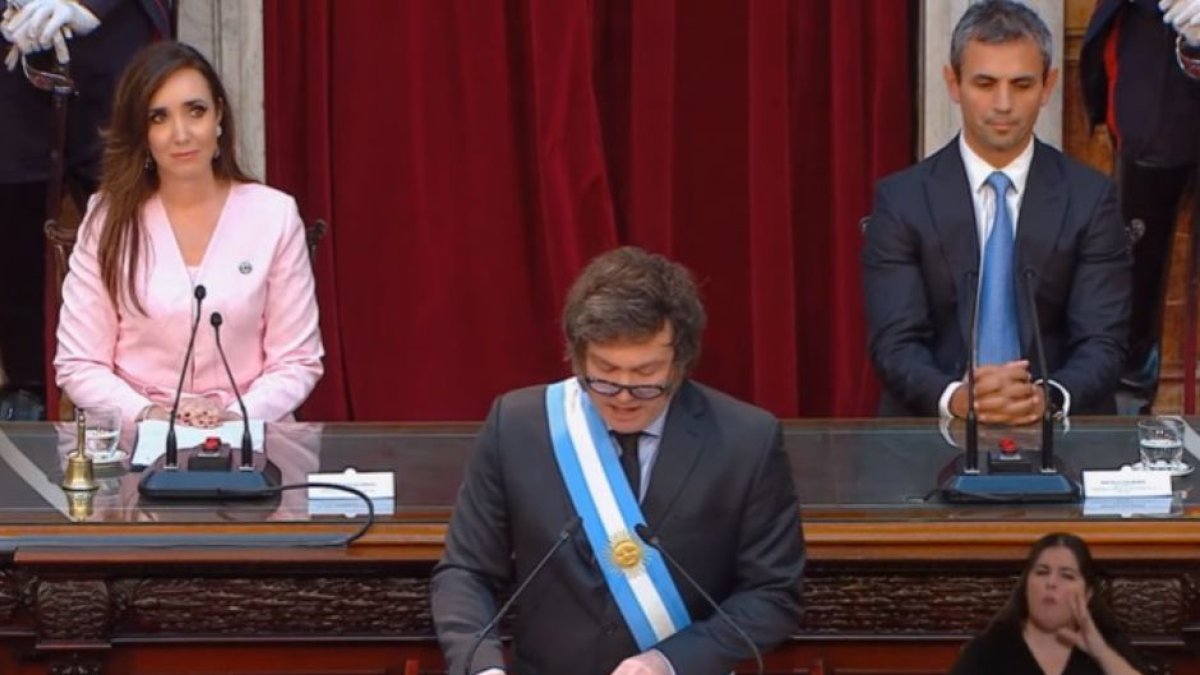"More capitalism and freedom": Milei clarified his vision in a historic speech before the Argentine Congress
The libertarian asked the Argentines for "patience and trust," before closing with his characteristic cry: "Long live freedom, damn it!"

Oficina del Presidente de la República Argentina
Javier Milei spoke for the first time in front of the Argentine Congress to inaugurate the legislative calendar. The president took advantage of the situation to make it clear that the country is at a “crucial moment,” as he went on to list the complex economic realities of the country that was passed down to him by Alberto Fernández, announce a new pact with the provinces and ask the Argentines for “patience and trust.” At the same time, he reminded citizens that “There is nothing more sacred than the fight for freedom.”
The libertarian entered the venue with hugs and was applauded before taking the podium to address the deputies, senators and governors. With quotes from King Solomon and Milton Friedman, Milei spoke for more than an hour, giving a speech that was divided into parts and then closing with his characteristic cry: “Long live freedom, damn it!”
The true state of affairs: “Some think that poverty appeared overnight”
Milei took advantage of his first meeting with Congress to avoid what many analysts considered one of the most critical mistakes of former President Mauricio Macri: not communicating the actual state of the country he inherited. The libertarian went point by point and clarified to the Argentines the state he received from Fernández and Cristina Kirchner.
Milei took his time detailing each and every one of the problems his administration inherited from the last government. He spoke of “negative net reserves,” “repressed prices,” “the dollar with a gap of 200%,” “unbridled issuance [of money] of 13 points of the GDP,” “a frozen labor market” and “60% poverty.”
In turn, he mentioned a pension system that “pulverizes Argentines,” a “defunded and discredited army,” and a current situation of “irrelevance on the world stage.” In summary, he spoke of the “regrettable material and spiritual state of our nation.”
How do you combat all this? Milei was clear, with “more capitalism and more freedom.”
“The silent majority raised its voice”
Once the economic diagnosis was made clear, Milei spent a few minutes explaining how an economist who was a complete unknown five years ago managed to reach the Casa Rosada. According to his analysis, the citizens “put in the presidency a man who has recently arrived in politics, who knows what he has to do, knows how to do it, and has the conviction to do it.” Of course, this man does not have many soldiers in Congress nor much territorial extension, which led him to refer to the book of Maccabees again.
“Because victory in combat does not depend on the number of troops, but on the strength that comes from Heaven,” he expressed to applause.
He also indicated that voters were tired of the “political caste” and instead went with a candidate who “chose to tell an uncomfortable truth.”
“If we do not change the economic model at its roots, Argentina has no future”
In the run-up, social networks channeled hundreds of thousands of versions of what the Argentine president would or would not say in his speech. Specifically, there were rumors of a couple of surprise announcements that would shake the political establishment.
Indeed, Milei announced a new comprehensive bill and a proposed agreement with the provinces, baptized as the May 25 Pact.
The bill is a reversal of the previous legislation that was undermined by the opposition in the Chamber of Deputies and will have the following points:
- Eliminate privileged retirements for president and vice president
- Force unions to have free periodic elections, with a maximum of 8 years of the same leader.
- People convicted of corruption after the second instance will not be able to be elected to public office.
- All former officials with a firm conviction of corruption will lose the benefits of having been an official
- Drastically reduce the number of advisors to deputies and senators
- Deduct the day’s pay from the salary of state employees who are on strike
- Eliminate public financing for political parties; only private financing
The second initiative aims to improve the relationship with some productive provinces and sign a pact with all governors to “establish the 10 state policies that the country needs.” Precisely, those ten state policies are the following:
- The inviolability of private property.
- The non-negotiable fiscal balance.
- The reduction of public spending to historical levels, around 25% of the Gross Domestic Product.
- A tax reform that reduces tax pressure, simplifies the lives of Argentines and promotes trade.
- The rediscussion of federal tax sharing will forever end the current excessive model.
- A commitment by the provinces to advance the exploitation of the country’s natural resources.
- A modern labor reform that promotes formal work.
- A pension reform that gives sustainability to the system, respects those who contributed and allows those who prefer to subscribe to a private retirement system
- A structural political reform that modifies the current system and realigns the interests of the representatives and those represented.
- The opening up to international trade so that Argentina once again becomes a protagonist in the global market.
Asks Argentines for “patience and trust”
Towards the last part of the speech, Milei assured that he was willing to “face the political costs” of his measures since “there is nothing more sacred than the fight for freedom.”
“We govern to once again make Argentina one of the greatest nations in the world,” he continued before asking citizens for “patience and trust” for the coming months, clarifying that “we have not yet seen the disaster we inherited.”
“God bless all Argentines and grant us the wisdom and strength necessary to overcome the challenges we face as a society and build a prosperous future for our Nation. May the forces of Heaven be with us,” Milei said in closing.

























